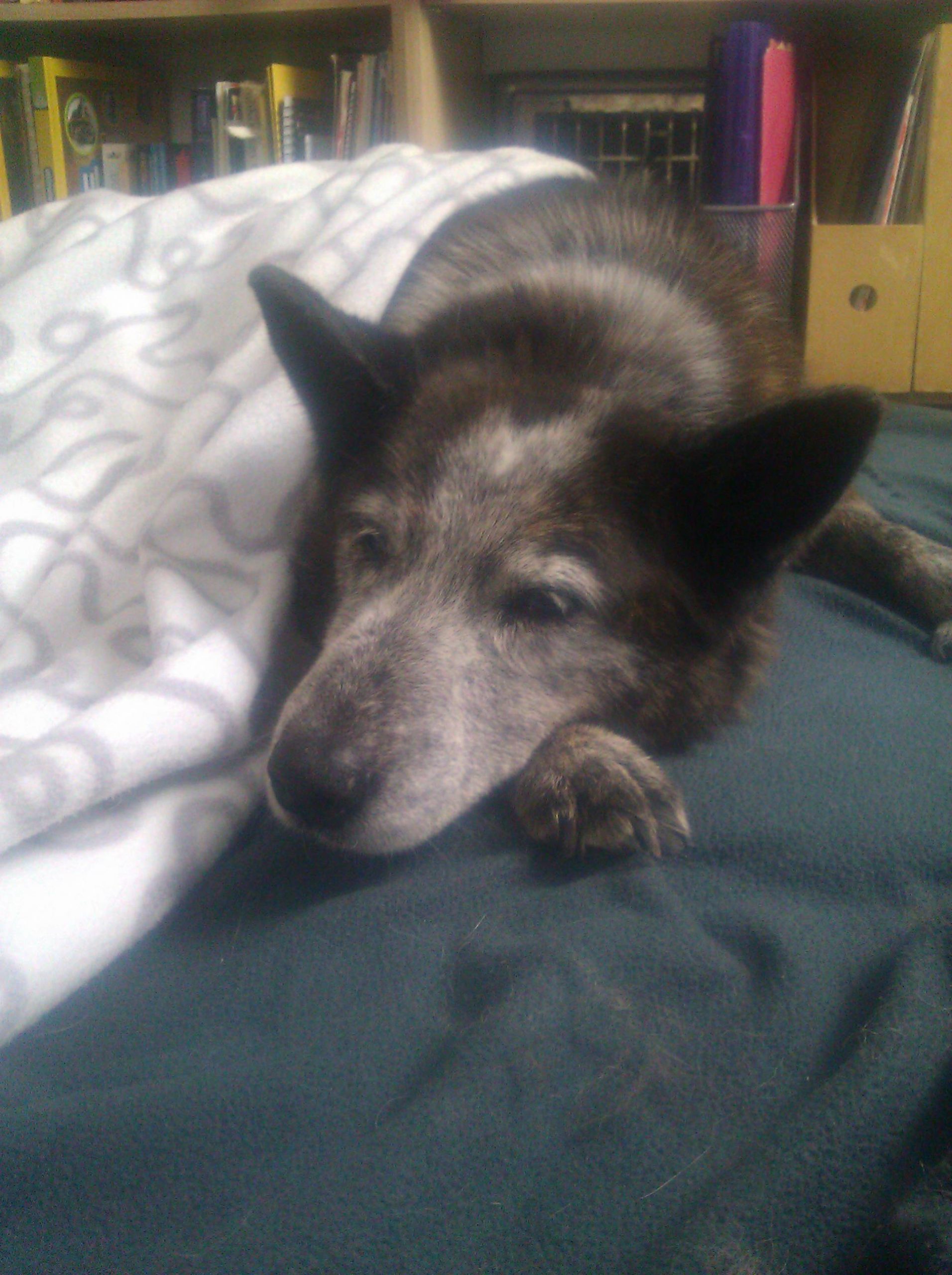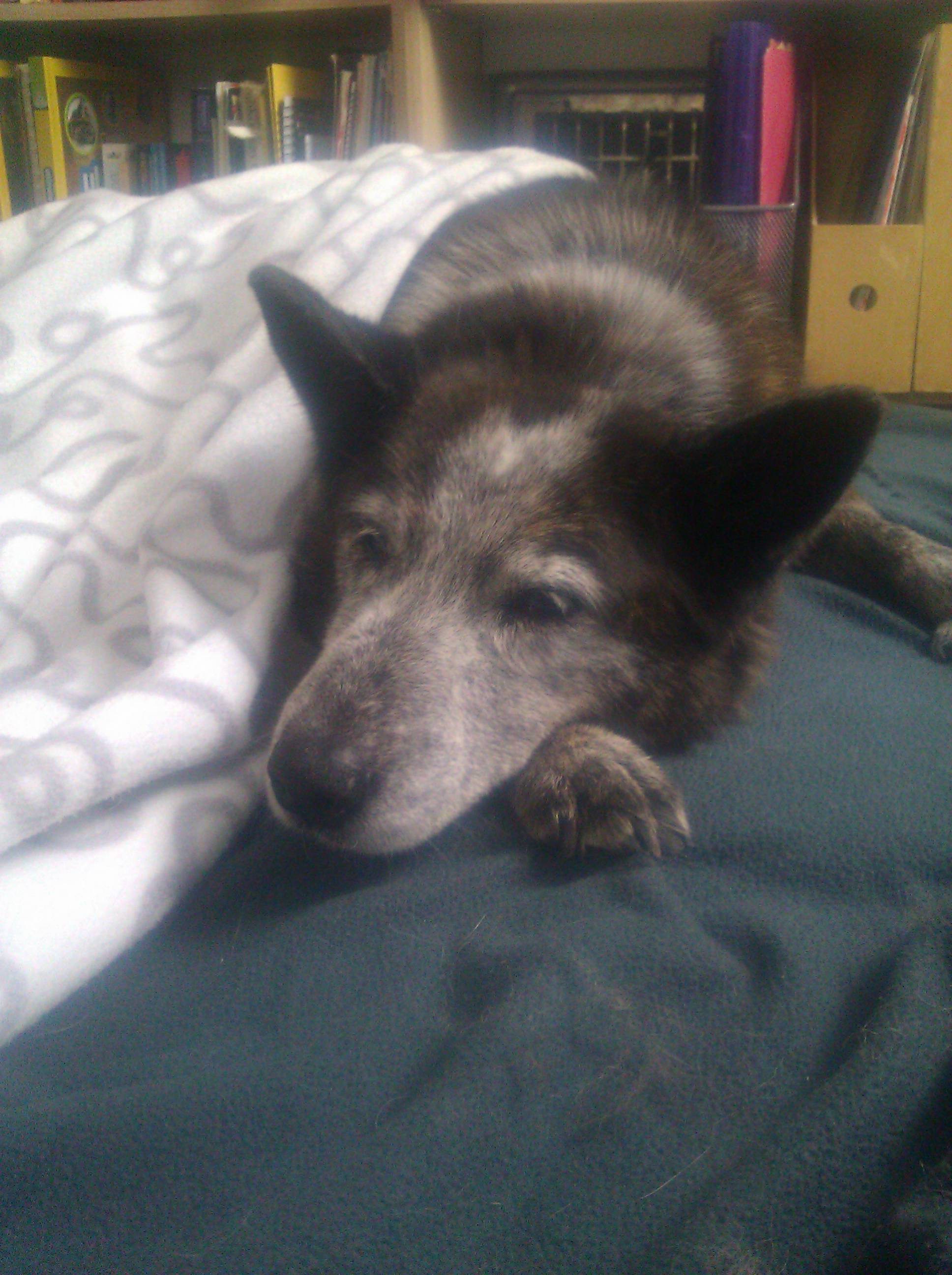

My dog is bathed and dried and wrapped up and next to the heating vent. I got her to eat a little this morning. She drank some watered-down unsalted beef broth (organic, because she is worth it), and it felt like a miracle. I’m sitting next to her, my computer on my lap, pretending to write my book, but really I’m just looking at my dog. Keeping close.
“Stay,” I say.
She thumps her tail.
“Stay,” I say again. She closes her eyes and groans she pushes her nose against my leg with a sigh.
When we live with dogs, we have a set of words that our animals are trained to obey on cue. We say, “Sit”, and they sit. But that isn’t always what we mean. When Harper was young – a gnarly, snarly, scruffy little street dog, narrowly escaping Death By Dogcatcher – I would say “Sit” and it would mean something very specific. “Sit” meant “Oh My God Stop Being Such A Crazypants, You Crazypants.” Sit meant “No, You May NOT Remove The Mailman’s Leg!” or it meant, “Bashing Your Head Against The Door Doesn’t Actually Open The Door!” or it meant, “If You Don’t Stop Barking At That Squirrel, I Might Actually Explode The House And Then You Will Be Sorry.”
Later, when we had kids, “Sit” meant “Keep Close To The Baby,” or it meant, “Stop Pulling On The Leash Or I Might Accidentally Knock Over The Stroller,” or it meant, “No, You May Not Climb Up Onto The High Chair Tray; You Must Wait For The Baby’s Food To Fall.”
And later than that, “Sit” meant, “Yes I Know Our House Is Overrun With Crazy Boys; Sit And Lean On Me And Know You Are Safe.” “Sit” meant “Everything Is Fine, I Promise.”
Today, she is having trouble pulling herself into a sitting position. She did it for a little bit this morning. “Sit,” I said, and I meant, “Please.”
“Sit, honey,” I said. Please, oh please.
“You can do it,” I said. Oh please, oh please, oh please.
She did it. For a little while. But eventually, her legs splayed out in front of her and she pressed her belly to the ground. She sighed.
When she was young I used to tell her to stay. It took a while for that one to stick. She was a ranger – it’s how she came to us in the first place. And no matter how tightly we had our fences and how high, she managed to find her way out of them. Usually at night. She’d trick us into letting her out claiming she had to pee (what a trickster!) and two minutes later she’d be gone. We’d hear her scratching at the door in the middle of the night (she’d climb over the fence), and there she’d be – shiny coat, bright eyes, a wanderer’s grin about her mouth. Sometimes she’d have something with her – a ham bone or a squeaky toy. We figured she had regular folks that she’d pay visits to.
“Stay,” we told her. What we meant was, “We’re worried about you. We know you’re smart and savvy and no car would ever squish you and no street dog would ever best you in a fight. We know you’re street smart and gnarly and canny. We know you can take care of yourself. But we miss you when you’re gone. And we need you.”
“Stay,” we said again and again and again. And, finally, she stayed.
Now “Stay” means something else.
She is pressing her back against my leg. I am leaning against the bookshelf and it is uncomfortable. I should get a pillow but I don’t want to. I don’t want to leave her.
“Stay,” I say. She thumps her tail.
Don’t go, my heart says. Please don’t go.
She thumps her tail.
“Stay,” I say again. “Stay, stay, stay.” Don’t go, don’t go, don’t go.
I love you, thumps her tail.
“I love you, too,” I say. “Don’t go,” I say out loud.
She thumps her tail.
I might have to, she says.
The vet is coming at three. I’d appreciate a kind thought or a prayer, if you happen to have an extra one lying around. Harper would appreciate it too.

I love you and I’m sorry for the heartbreak.
I love you too. <3
Oh Harper. Hugs and prayers.
Oh! This brings tears to my eyes. God be with you and your sweet baby. On Christmas day, I had to have my granddog, Domino, euthanized. He was a beautiful eight year old Akita. We loved him so much. My son had gone out of town for the holidays. We were babysitting Domino since he’d had surgery a few days before and just wasn’t up for a thousand mile road trip, yet. Domino visited often and we traded babysitting with my son whenever we couldn’t take our dog, Buzzy, on trips. Domino got sicker. I took him to the emergency vet where they ended up doing exploratory surgery. Poor Domino had advanced cancer; nothing could be done. It broke my heart to give my son the news, so he could make the obvious choice. We all loved Domino and still miss him. I feel for your pain. So, so sorry.
Reblogging your beautiful story on Nutsrok. Thanks.
Reblogged this on Nutsrok and commented:
Reblog from Kelly Barnhill. Be thinking of her today. Nutsrok
Oh, Kelly, I am sitting here with tears streaming down my face. I have no words for you. Only my tears, to mix with yours as you stay. With Harper. Stay, Kelly.
Godspeed, sweet angel in dog’s fur. God Bless, sweet human friend who stayed. Forever. May you meet again on the other side.
Karen
Sobs and heaves, Kelly. I’m with you. Tenny said a little prayer for Leo last night. Wrapping you in love and prayers. I’ve felt Gebo nearby lately. Maybe they all are. Big, big hugs.
I’m so sorry, Kelly. Big hugs for you and Harper.
None of the prayers I have lying around are special enough for this good old dog or for you so I said a new one.
My good old dog and I are thinking of you both, and mostly about all the years that came before this one.
x
Sending you all the love in the world.
Dear Kelly,
You don’t know me, but I love reading what you write. I also think you might know my wonderful neighbor, Liz Klages (mom of Kean Johansen senior at South). I just want to tell you that I really know what it is like to have a very elderly pet and to have to make the heartbreaking decision to have the vet come. I know what it is like to phone the vet, sobbing, and ask whether he can come even sooner. I’m so glad your vet is coming to your house, which is so much more peaceful, and I am so glad that you can be with Harper through the day. She clearly knows she is so loved. My thoughts will be with you today.
Warmly, Cindy
You poor love, and poor Harper. You are there with her and for her. She knows, and show you her love in return the only way she can now.
You will be reunited at Rainbow Bridge. Harper will be waiting for you. I am so sorry. <3
Every dog I meet this week I will whisper to them and say, “There is an old one coming, a great one. It might be soon. If you are a good dog you may howl to salute their soul. But only if you are a good dog.”
I hope I don’t hear any howls.
May you and your family find comfort.
I’m crying, been there, done that
What a sad time for you and Harper. It’s good that you are with him. That’s all you can do to keep that special loving connection during this time. I’ll always remember Hercules, my 13 year old Shih Tzu, during his last hours. How I stayed with him trying not to completely break-down, hard as it was, for his physical and emotional comfort in passing. Prayers for you, and peace for Harper. Christine
Hard, hard, hard, hard, Been there done that held a Beloved in my arms as the light went out. My heart goes out to both of you.
Hold on. Hold on to the memories. The spirit never dies. And there will be times when your fingers will remember the feel of that particular fur underneath them.
I lost a heart-s-beloved cat juts over two years ago. He still haunts me. In the beginning it used to make me cry. Now it makes me smile, and remember him.
If it is time, let Harper go. And may your memories stay bright.
Kelly, you really should’ve warned me not to read this. Jesus. Too fresh.
Stay, Harper. Just stay.
My friend, Sarah Ahiers sent me your blog post and I’m glad she did.
I lost my Tank a few weeks ago. It was time. He was ready. But we never are.
I was a veterinary surgical assistant for many years, but despite all my training, I still have trouble saying goodbye.
My love to Harper. She has a good mom. My hugs for you. Bless you both.
Aw. We went through that twice last year at this time – two elderly dogs who became too ill and had to be released from their suffering, one from bloat and one from cancer, within a month of each other. Right to the very end, they tried to obey simple commands, and the German Shepherd (despite being in severe pain) made every attempt to get between his owner and any perceived danger. It’s so hard to let them go, but sometimes it’s the only humane decision, and the good memories of their lives never leave us. Being with the pet at the last moment, providing hugs and comfort, is the best you can do.
My thoughts are with you. What a hard time to be going through. Lots of love to you and Harper. x
Tears happening here – for you, and for all the times I’ve wanted them to stay and they’ve had to go. So, so sorry.
Thinking of you and your lovable, muse/dog/friend.
Sending all my love from Warkworth, Ontario, Canada. This breaks my heart. May all the love pull you through the rough days ahead.
Ah Kelly
It comes to us all the time unfortunately we have lots of dogs here who have been well loved and who have loved us well also and there’s the one bitzer – cross Kelpie/Shepherd – who snuck into the deepest recess in my heart – The Judge – I don’t know if this image will come through but Harper will be waiting at the gates for you to come eventually, young and pain-free along with all of mine and everyone else’s for you to come and you can cross the bridge together.
I am so happy your vet is coming to your house – it’s much better that way – it’s not the cold, clinical place – she can go happily knowing all her family are there and her toys and her bed – it’s the way it should be.
Love, hugs and sympathy and Zen flowing for you all.
Janet
It’s time to let her go and you love her enough to know that. Bless you … and her. We just went through the “waiting for the vet” experience a few weeks ago. So painful.
I just started reading your blog this year and, as the mom of a couple of dear old rescue dogs, have been following Harper’s story very closely. I’m so sorry to hear that this has come to pass. Our dogs seem to have one job, to love us to the exclusion of all else, it is our responsibility and our joy to love them in return. You and Harper…you had that in spades. She LOVED you, for a thousand years she loved you and your family, a love that you will always have with you and that you will remember and talk about for the rest of your life. What better way to honor her than that? My thoughts are with you and Harper. I will hold Chelsea, my own little blue cattle dog, and pray that she lives a thousand years too.
“STAY” touched my heart and soul. My prayers for HARPER, you and your family. Papa Rex my 12 year old senior passed away 12/2/14. Now he runs pain free through the clouds and stars. I stared at the photo of Harper, she is the female version of Papa Rex. Life became bittersweet as I watched Papa moving slowly, weaken and struggle to sit and walk. I wanted my proud senior gentleman to leave in a dignified way. But in my heart and soul I wanted him to “STAY” forever. Celebrate and cherish HARPER, her love and memories are forever with you….
Kelly check out my profile photo it’s my Papa Rex. Harper meet Papa Rex he’s a gentleman with a kind soul. Look for him someday, your spirits can run free.
OH, WOW! They could be siblings. What a sweet face!
YES, When I saw the photo of Harper I had chills. I thought I was looking at Papa Rex.
Your love is priceless and I feel your bittersweet love story. Harper keep on living with love, warm hugs and broth!
Oh Kelly, sending you love and hugs. My Xena and I are at the same point. I say please in my mind every time she still eats, drinks and can get herself up to walk.
Thanks Kelly. I’ve read this post a couple of times. It means a lot to me. Sincerely, Susan Lynx 612-940-0906
SUNFLOWERS MASSAGE AND WELLNESS LLC Helping you to relax and heal.
> On January 8, 2015 at 10:47 AM Kelly Barnhill > wrote: > > kellybarnhill posted: ” My dog is bathed and dried and wrapped up and next to > the heating vent. I got her to eat a little this morning. She drank some > watered-down unsalted beef broth (organic, because she is worth it), and it > felt like a miracle. I sit next to her, my compu” >